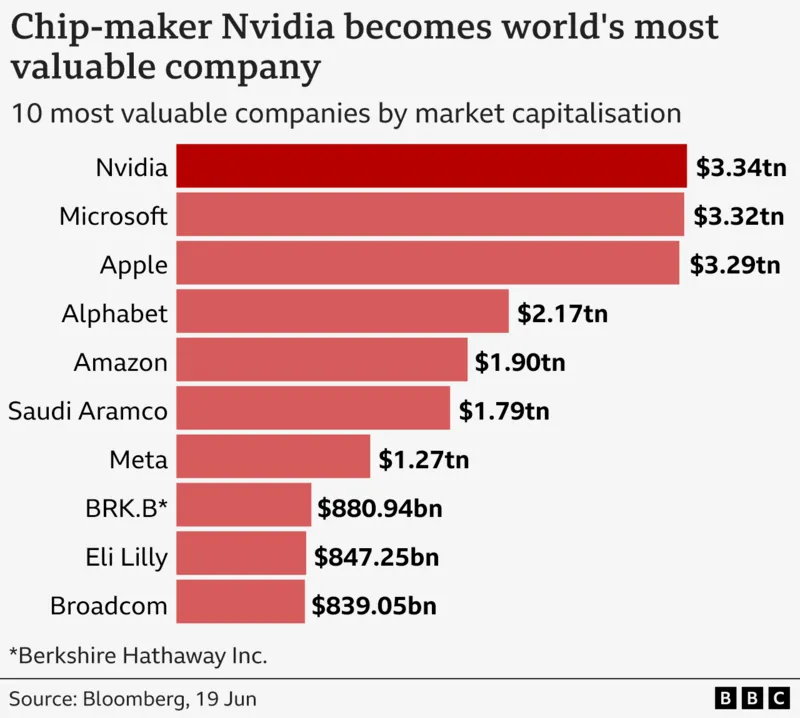Nvidia tops the world’s valuable companies due to AI hype.
Nvidia, the renowned chip manufacturer, has recently achieved the status of the world’s most valuable company following a record high in its share price on Tuesday. The company is now valued at an impressive $3.34 trillion, with its stock price nearly doubling since the beginning of the year. This remarkable growth reflects a significant surge in investor confidence and market interest.
On the trading day in question, Nvidia’s stock closed at nearly $136, marking a 3.5% increase. This rise in value has positioned Nvidia ahead of other tech giants, including Microsoft, which it has now surpassed. Earlier this month, Nvidia also overtook Apple, further solidifying its dominance in the technology sector.
The meteoric ascent of Nvidia can largely be attributed to its leadership in producing chips essential for artificial intelligence (AI). As the demand for AI technologies continues to grow, so too does the need for high-performance chips, which Nvidia specializes in. This trend has drawn the attention of investors and analysts alike, who recognize the immense potential in this market.
Analysts have referred to these vital chips as the “new gold or oil in the tech sector,” highlighting their critical role in driving innovation and growth. Nvidia’s ability to capitalize on this demand has not only propelled its stock prices but has also established the company as a key player in the rapidly evolving tech landscape.
Nvidia stock price has soared over the past 18 months
Chris Penrose, the global head of business development for telco at Nvidia, spoke at an event in Copenhagen, where he forecasted continued growth in the sector. He emphasized that the generative AI journey is fundamentally transforming businesses and telecommunications companies around the globe, noting that we are still in the early stages of this transformation.
Analysts from Wedbush Securities echoed his sentiments, predicting that the competition for a $4 trillion market cap in the tech industry will be a major focus in the coming year. They highlighted that Nvidia, Apple, and Microsoft will be key players in this race, positioning themselves at the forefront of technological advancements.
Read Also: Telegram Claims That The Arrested CEO Durov Has No Secrets to Conceal.
Despite this optimism, some commentators have expressed skepticism about the potential for significant future gains for Nvidia, citing the rising competition it faces in the market. This concern raises questions about the sustainability of growth in an increasingly crowded landscape.
Rise and rise
Nvidia’s remarkable growth has made its CEO, Jensen Huang, a prominent figure in the tech world, earning him the nickname “Taylor Swift of tech” from Meta’s Mark Zuckerberg. Eight years ago, Nvidia’s stock was valued at less than 1% of its current worth, primarily driven by competition with AMD in the graphics card market. However, recent years have seen a significant shift as demand for chips that support generative AI models has surged, particularly with the rise of applications like OpenAI’s ChatGPT.
In addition to the AI boom, Nvidia also experienced a substantial increase in sales during the cryptocurrency mining rush of 2020. This dual demand has solidified Nvidia’s position as a leader in the AI chip market, allowing it to thrive amid fierce competition among major tech players like Microsoft, Google, Meta, and Apple, all vying to create cutting-edge products.
Huang’s popularity extends beyond business achievements; in Taiwan, he is celebrated like a rock star, with fans eager to take photos and seek autographs. His unique blend of technical expertise and charismatic presence has contributed to his celebrity status, making him a recognizable figure not just in the tech industry but also in popular culture.

Nvidia’s sales and profit figures have consistently exceeded analysts’ expectations in recent years. Following the release of its latest financial results, Quilter Cheviot technology analyst Ben Barringer noted that the company had “once again cleared a very high hurdle,” emphasizing that demand shows no signs of slowing down.
On the other hand, some analysts remain cautious. Barclays credit analyst Sandeep Gupta expressed concerns in February, arguing that Nvidia’s substantial market share could be challenging to sustain amid a growing number of competitors. He also questioned how Nvidia’s customers would effectively monetize AI software in the evolving landscape.





